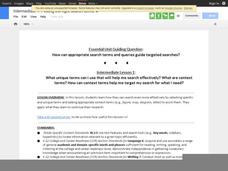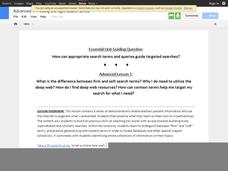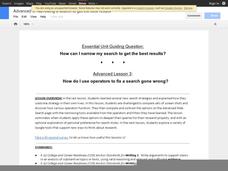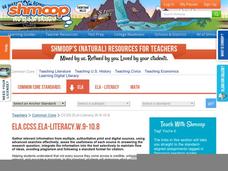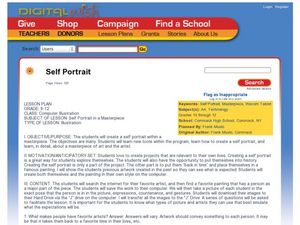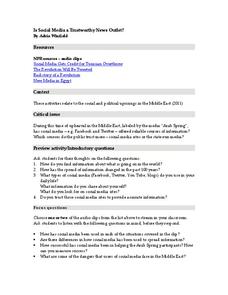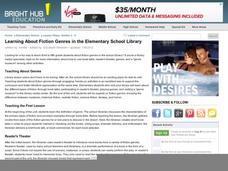Google
Beginner 4: Searching for Evidence for Research Tasks
Having a strong searching skill set can make a research project much easier and much for successful for pupils. Tackle finding evidence with the ideas included here. The ultimate goal is for class members to learn the stepping stones...
Google
Intermediate 3: Narrowing a Search to Get the Best Results
Examine advanced filters and operators in depth. Class members try out even more filtering tools than they did in the beginning lesson and practice with operators, special symbols or words that affect search results, recognized by...
Google
Beginner & Intermediate 5: Evaluating Credibility of Sources
Convey how to determine appropriate and credible online sources with a series of three lessons. After completing the lessons, class members will know what kinds of sources to use, how to identify credible sources, and how tone and style...
Google
Intermediate 1: Picking the Right Search Terms
A search can be strengthened by unique terms. With the activities and presentation included here, show your class how to target their searches with unique terms and context terms. They can then practice their search skills with...
National Geographic
People and Whales: A History
Whales and people have had a long and sordid history. To understand the impact that biological populations have had on each other, learners conduct research on specific topics related to the whale industry. They use their findings to...
Google
Advanced 5: Evaluating Credibility of Sources
How do discerning readers determine bias and credibility? Ask small groups to figure it out! First, each group is provided with either articles or videos that contain bias. They examine the resources, respond to included questions, and...
Google
Advanced 4: Searching for Evidence for Research Tasks
Research was very different in the past. Pupils once had difficulty finding sufficient information, but now they have the opposite problem. Show your class how to pick the best resources out of the millions of sites an online search will...
Google
Advanced 2: Understanding Search Results
Effective researchers use a variety of techniques to find what they need online. Pupils who complete the activities listed here should already have an arsenal of strategies for searching. They will learn about and practice two new...
Google
Advanced 1: Picking the Right Search Terms
Many people, when searching online, will type in what they are looking for without much thought. But what's the next step, if they don't get the desired results? Careful selection of search terms. Your class can develop a sense for...
Google
Advanced 3: Narrowing a Search to Get the Best Results
Familiarize your class with Google operators, specific symbols, or words they can use to express more clearly to the search tool what they want to find. With the resources included here, they can test their previous knowledge, view...
Learn NC
Buffalo Soldiers
"Stolen from Africa, brought to America,/Fighting on arrival, fighting for survival." Bob Marley's "Buffalo Soldiers" provides high schoolers an opportunity to explore the rich history of the Rastafarians in Jamaica and the Buffalo...
Shmoop
ELA.CCSS.ELA-Literacy.SL.11-12.3
Dr. Martin Luther King Jr.'s speech, "I Have a Dream," is one of the most famous in United States history, but why was it so effective? Ask your class to determine the answer to this question. While the resource includes a description of...
Shmoop
ELA.CCSS.ELA-Literacy.SL.11-12.2
One way to get your class to evaluate and synthesize multiple multimedia sources is through a research project. The idea here is that class members will watch videos and listen to scientific debates in order to create a casebook about...
Shmoop
ELA.CCSS.ELA-Literacy.W.9-10.8
Demonstrate the importance of evaluating and citing sources. Pupils can complete the suggested assignment provided here, or one of your choosing, while focusing on checking that the resources are credible and citing those sources...
Shmoop
ELA.CCSS.ELA-Literacy.W.9-10.6
Make the move toward incorporating more technology in your classroom and help to prepare your class for the professional world. Here is a resource that describes the Common Core standard while incorporating technology and English...
Digital Wish
Illustration: Self Portrait in a Masterpiece
Technology and art combine in a creative lesson. Kids discuss portrait art and they search online and save a portrait created by one of their favorite artists. They have their picture taken exactly like their chosen portrait, then use...
Curated OER
Is Social Media a Trustworthy News Outlet?
Examine the role of social media in social and political uprisings. Pupils listen to NPR audio clips about social media and the Arab Spring and read an article that proposes the idea that revolution will not happen through social media....
Curated OER
Who is the Expert? Exploring Credible Sources in Healthcare
How do you decide what sources are credible when researching online? Evaluate sources with a focus on researching health issues. After brainstorming common health concerns and how they would try to diagnose these problems, class members...
Curated OER
Credible Sources on the Internet: What to Trust, What to Dismiss and When to Cite a Source
Wait, you mean researchers don't all use Wikipedia? Teach your class about intelligent research with a lesson about evaluating digital sources. The lesson starts with a quickwrite and includes vocabulary exercises and several...
Hawaiʻi State Department of Education
Revelations
They say art often imitates life. Learners research and write an expository paper on modern dance choreographer, Alvin Ailey. They focus on describing how his life and background has influenced his dance creations. This is a great way to...
North Carolina State University
Integrating Your Research
Employ this resource to expand efficient ideas on how to present and organize activities that describe how researchers can implement their research by using direct quotes, paraphrasing, and summarizing—without plagiarizing. Activities...
Curated OER
Learning About Fiction Genres in the Elementary School Library
Teaching about fiction genres can be challenging. The instructional activity here, designed for library media specialists, offers a fun way to do it. In the instructional activity, learners visit the library and learn about the...
San Francisco Symphony
Instrument and Visual Appreciation of Art
There are a lot of great ideas to be found here. To better understand the connection between art and history, learners research several music and art pieces, then relate them to major social events. They study the lives and works...
San Francisco Symphony
Music and Early Man
Creative projects are great ways to increase interest in topical research. Middle schoolers learning about primitive life styles in the Americas explore the importance of music to hunter gatherers. They research and create musical...





